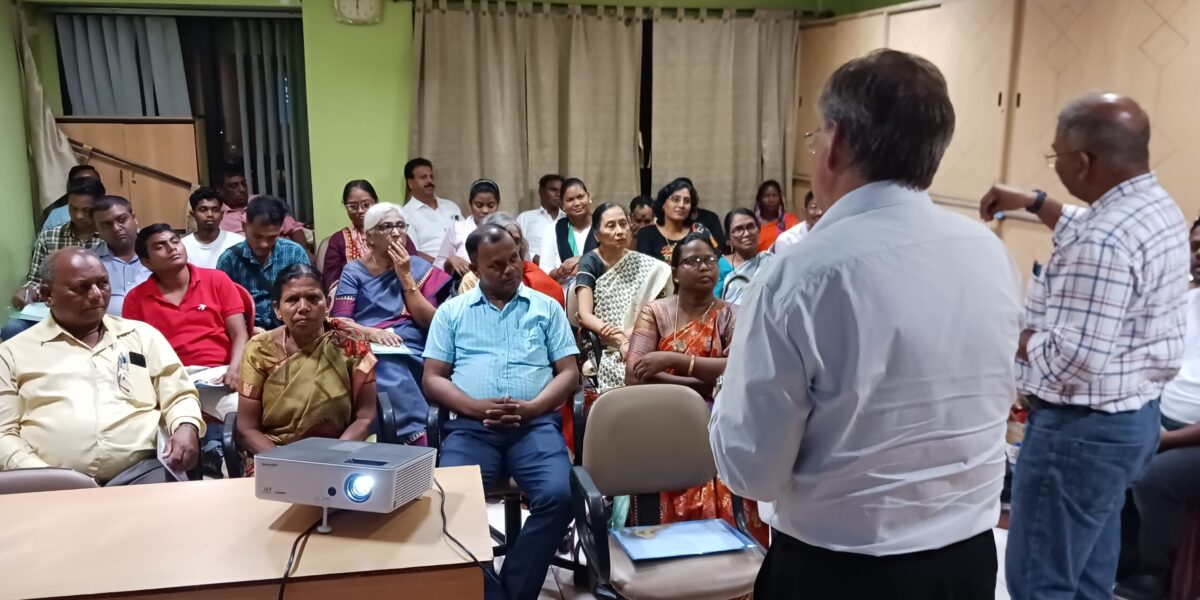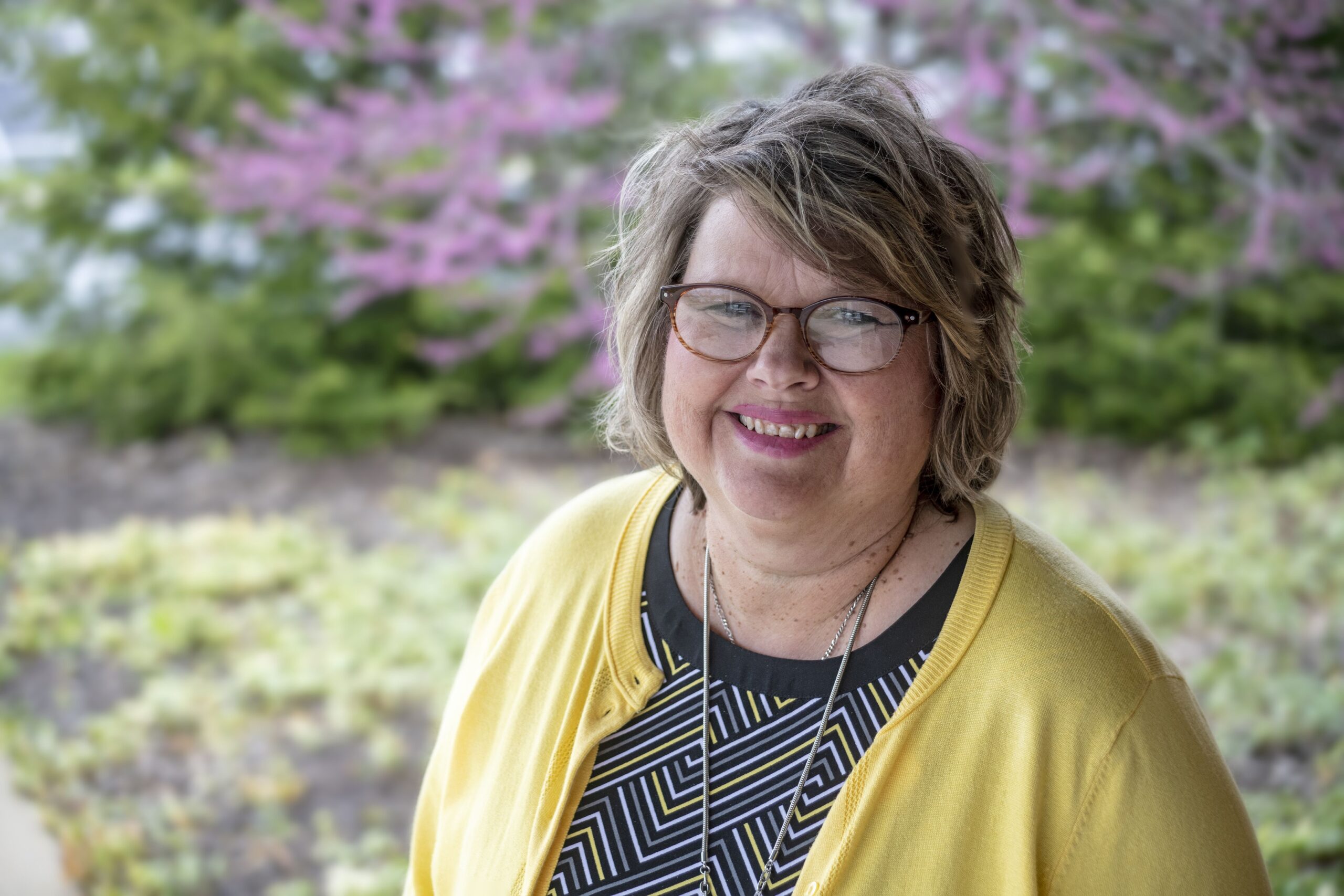North American visitors find churches growing, even where there is persecution.
Teachers from Anabaptist Mennonite Biblical Seminary (AMBS) and Mennonite Mission Network became students of Anabaptist faith in India in October.
Members of a North American teaching team who facilitated a three-day workshop in Kolkata were inspired by Indian Mennonites and Brethren in Christ who are standing firm in their faith while facing religious resistance.
“I am struck by how non-anxious Indian Mennonite leaders seem to be in their minority status,” said teaching team leader David Boshart, AMBS president. “Their steadfastness can help Western Christians to reflect on what it means to be faithful within the increasing secularism in our own context. . . .
“The Mennonite churches of India have much to teach the global church about what faithful witness looks like when the church cannot assume a position of privilege in society.”
Boshart noted that many Indian Mennonite churches are growing, even in places where they are experiencing persecution.
“They are important to the global church right now because they exist as a small religious minority in a country where the majority religions have varying degrees of tolerance for Christians, depending on the region,” he said.
Joe Sawatzky, Mission Network’s training and resource specialist in mission education, was impressed with how the Indians humbly attributed their growth under pressure to God’s grace and empowerment.
He cited the Balrampur church, which two years ago was only half full and is now overflowing.
“God started to draw Hindu people to the church,” Sawatzky said. “They came seeking healing, and the Christians prayed for them. God answered their prayers, and the people went back to their communities and told their friends and relatives about Jesus Christ, becoming evangelists to their own people, who in turn joined the church.
“They attribute everything to the grace of God. It is like this is simply happening, and they do their best to love and pray for the people who are coming to the church.
“What are the lessons for us in this? That God is living and active. Healing is central to evangelism. Our simple obedience is enough.”
During the workshop, held on the grounds of the Baptist Missionary Society, the North Americans experienced an exchange of strengths, perspectives, needs and gifts.
They began growing new friendships, such as one with Benjamin Nand, executive director of the Mennonite Christian Service Fellowship of India, or MCSFI.
Another friendship is with Vickal Pravin Rao, executive secretary of the Mennonite Church in India and the pastor-in-charge of Mennonite Church Rajnandgaon.
As part of MCSFI — the umbrella group for the Mennonite and BIC conferences in India — the two men and others invited the North Americans to help strengthen leadership formation among their communities.
With COVID-19 lockdowns behind them, they are seeking to revitalize their ministries. They welcome accompaniment and resource development from international Anabaptists.
“Our leaders have been struggling to generate a second tier of leadership,” Nand wrote in an email from India. “Many leaders who see themselves as permanently appointed don’t think to leave space for the next generation to come up for leadership.”
Nand said servant leadership was the most helpful idea for him.
“As we read the teaching of Jesus and how he washed his disciples’ feet, he sets an exceptional example for us,” Nand said. “If I follow the teaching of our Lord, my life and ministry could transform many souls.”
Team Support member Andi Santoso, Mission Network’s regional director of Asia/Middle East, was impressed by the convictions of leaders such as Nand to “share the gospel of peace in the global community as they strive to live in harmony with other religions,” he said. “They deal with many other world religions but stay hungry, stay thirsty to know Jesus and to make him known.”
Boshart said the MCSFI executive team is helping India’s churches remain steadfast in their mission.
“They tell us how much encouragement they feel through this accompaniment,” Boshart said. “These leaders feel the loss of the support they experienced from missionaries in the past, not because they were dependent on them but because their accompaniment provided significant encouragement.”
Boshart, Santoso and Sawatzky served on behalf of the Global Leadership Collaborative. Launched by former AMBS President Sarah Wenger Shenk, the initiative also engages personnel from MC Canada International Witness and Mennonite World Conference. It provides theological education in international communities upon invitation of those communities.
The first initiative offered a master’s program in partnership with the Meserete Kristos Seminary in Ethiopia. Now the collaborative offers a master’s program in South Korea, and AMBS’s journey program is being offered in Southeast Asia.
“Mission Network has deep historic relationships with these national church bodies, and AMBS has the faculty strength to offer teaching,” Boshart said. “Together, it is possible to be more responsive in offering the precise kinds of resources that the global church is asking for.”
While in Kolkata, the three instructors stayed at the Mennonite Central Committee headquarters. Boshart is grateful for the accompaniment role MCC continues to play in India.
“It is hard to tell the Indian Mennonite story without referencing the excellent mission of MCC,” Boshart said. “. . . The church owns what MCC is doing, while MCC works carefully to align with the values of the church conferences. It really is a good model.” The Indians and North Americans hope to continue the exchange.
“Mission Network values the legacies of North American missionaries and also the new leadership era of the national Indian leaders together with MCSFI,” Santoso said. “We want to carry a new way of partnership where everyone is sharing their gifts.”








